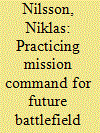| Srl | Item |
| 1 |
ID:
182029


|
|
|
|
|
| Summary/Abstract |
This article examines the relationship between different conceptualizations of the character of war and the role of land operations and tactics. Cold-War era expectations for a conventional war against a high-technological peer adversary, Revolution in Military Affairs (RMA), “New Wars” theory, Counterinsurgency (COIN) and Hybrid Warfare all denote different implications for the role and relevance of land forces. While Europe’s increasingly uncertain and unpredictable security environment in recent years has validated the continued relevance of conventional land operations, research in this area should encourage more integrative and cumulative research on future warfare and the potential of land forces.
|
|
|
|
|
|
|
|
|
|
|
|
|
|
|
|
| 2 |
ID:
175453


|
|
|
|
|
| Summary/Abstract |
As armies across Europe are currently developing capabilities to fight a high-intensity conventional war against a peer adversary, these armies will have to develop units that can fight independently in a complex environment, with limited direction from higher levels of command. Integral to this process is the need for a competent practice of mission command, viewed as a key component of maneuver warfare. The article identifies a set of enablers that need to be present in a military organization in order to practice mission command efficiently, including shared understanding and trust; initiative; a tolerant approach to failure, success, and learning; and the acceptance of mission command as an all-encompassing practice. The article then presents data from interviews with Swedish army officers focusing on the presence and significance of these enablers in their professional context. The article concludes that the increasing complexity of the peacetime tasks performed by military officers give rise to conflicting leadership demands. Consequently, exercising mission command and socializing younger colleagues into the practice is a far from straightforward process, which frequently competes with other demands placed on officers by their colleagues, the organization that they are part of, or the broader societal context.
|
|
|
|
|
|
|
|
|
|
|
|
|
|
|
|
| 3 |
ID:
167883


|
|
|
|
|
| Summary/Abstract |
In this article, we investigate the European Union's (EU) role as a normative foreign policy actor and its troubled relations to Russia and China. We contend that the lack of preparedness of the EU to foresee the increasingly tense relations with these countries can be explained through a role theoretical perspective. We show that the attachment of the EU to its role as a normative international actor reduced its awareness of Russia's and China's growing refusal to accept the EU's ambition to diffuse liberal norms and principles. The EU's inability to read the changing role expectations of China and Russia hampered the shaping of an appropriate foreign policy leading up the diplomatic crises with these two countries in the late 2000s and early 2010s, respectively. Theoretically, the findings contribute with a novel understanding of role conceptions in terms of reducing an actor's preparedness to acknowledge changes to its international role position caused by challenges raised by antagonistic partners.
|
|
|
|
|
|
|
|
|
|
|
|
|
|
|
|
| 4 |
ID:
170750


|
|
|
|
|
| Summary/Abstract |
This article explores the scope conditions of national role conceptions as reference points for foreign policy decision making during crises. It aims to contribute to a refined perspective of the agency of new states undergoing socialization processes in relations with significant others. Drawing on a primary material consisting of interviews with Georgian and US officials, the article analyzes the significance of Georgia’s role conceptions in the country’s relations with the USA in relation to two major crises: the 2007 riots in Tbilisi and the 2008 war with Russia. The article posits that crises provide situational circumstances where the requirements of appropriate behavior associated with role expectations may enter into conflict with the demands of the immediate situation. In order to resolve ensuing role conflicts, actors face the need to both rationalize role expectations, and to compensate for departures from them. In turn, these strategies relate to the possibility for change and stability in role conceptions, and by extension their enactment in foreign policy. The analysis of the Georgian government’s management of the two crises demonstrates actions that implied both rationalization and compensation, aiming to retain the credibility of its existing role conceptions in the eyes of its US counterparts.
|
|
|
|
|
|
|
|
|
|
|
|
|
|
|
|